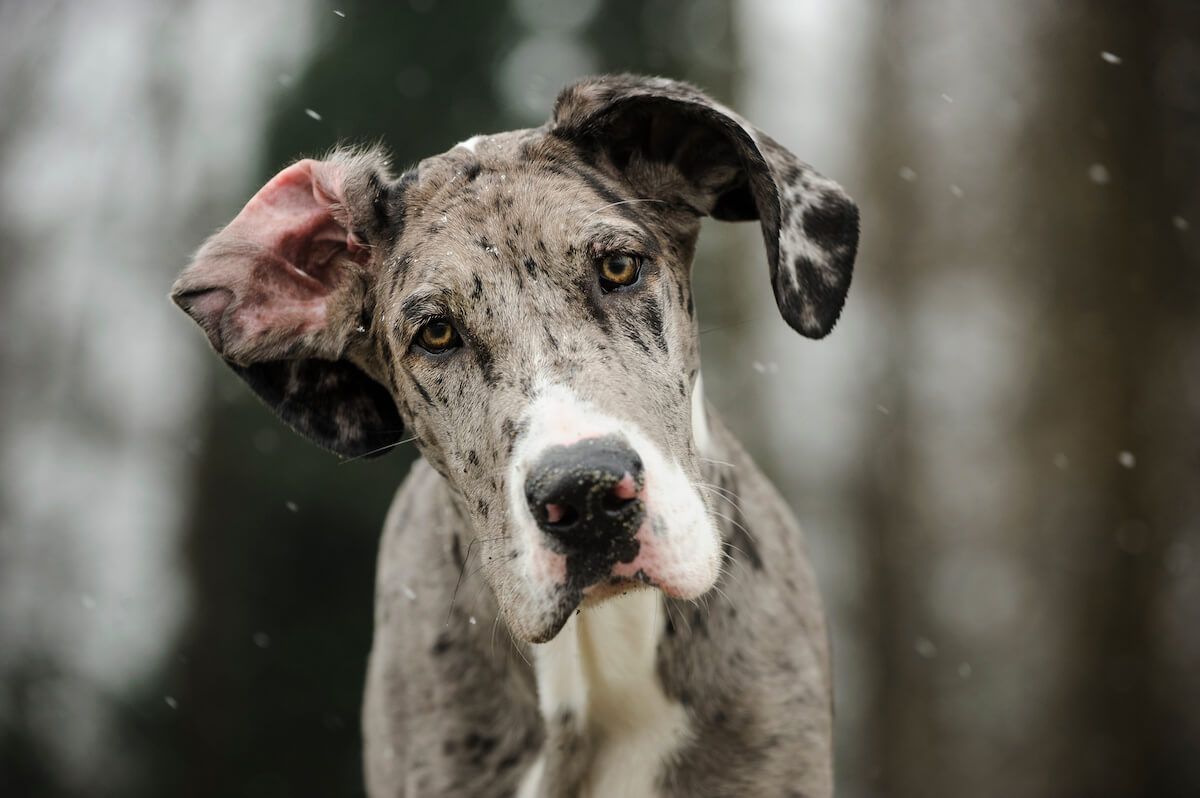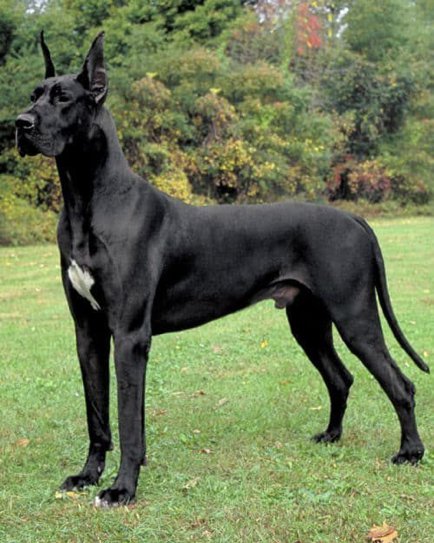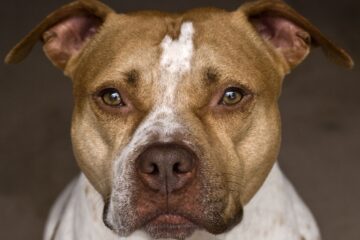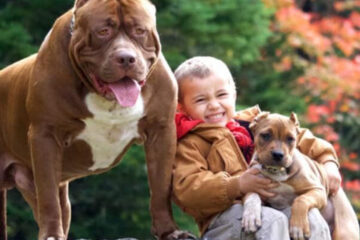Great Danes can become aggressive and have a serious and life-altering impact on victims, as they are extremely territorial dogs and can attack with little warning. However, they are generally considered to be gentle giants and good-natured family pets.
Great Danes are sociable, friendly, and eager to please, and they respond well to firm, consistent training methods. They need human contact, affection, and socialization with other people and animals. While some Danes can be destructive when left alone, they are typically good family dogs and do well with children.
It is important to determine if they need to be crated when left alone for their safety and the preservation of your home.

Credit: nativepet.com
Understanding Great Danes Aggression
Great Danes, known for their majestic stature and gentle demeanor, are often misunderstood when it comes to their behavior, particularly their aggression. It’s important to delve into the intricacies of Great Dane aggression to debunk myths and provide clarity on this topic.
Is Aggression Inherent?
Great Danes, by nature, are not inherently aggressive. Like any breed, their temperament is influenced by various factors, including genetics, environment, and training. It’s crucial to understand that aggression in Great Danes is not a default trait but rather a result of certain circumstances.
Temperament And Socialization
Temperament plays a crucial role in shaping a Great Dane’s behavior. Proper socialization from an early age can help mitigate any aggressive tendencies. By exposing them to different people, animals, and environments, Great Danes learn to interact positively and develop a well-rounded temperament.
Rage Syndrome In Great Danes
Understanding the behavior associated with Rage Syndrome in Great Danes is crucial for their proper management and training. This condition manifests as intense outbursts of aggression, often triggered unexpectedly in response to seemingly benign situations. Affected dogs may exhibit freezing, staring, and rapid escalation to biting.
Behavioral Characteristics
- Intense outbursts of aggression
- Unpredictable behavior
- Dramatic responses to seemingly minor triggers
- Freezing, staring, and rapid escalation to biting
Management And Training
Proper management and training are essential in dealing with Rage Syndrome in Great Danes. Here are some strategies to consider:
- Evaluate triggers and avoid potential stressors
- Provide a calm and structured environment
- Implement positive reinforcement training techniques
- Seek professional help if needed
Great Danes As Family Pets
Great Danes are known for their gentle and friendly nature, making them excellent family pets. While their towering stature may seem intimidating, these giants are often referred to as gentle giants due to their affectionate and loving temperament. They can be loyal and protective while also being sociable and adaptable to various living environments.
Sociability And Trainability
Great Danes are sociable, friendly, and eager to please, making them wonderful companions for families. They respond well to firm and consistent training methods, making them relatively easy to train. It’s important to provide ample socialization with people and other animals, as this helps them develop into well-mannered and well-adjusted pets.
Exercise And Space Requirements
Due to their large size, Great Danes require adequate space for both exercise and relaxation. While they can adapt to apartment living, it’s essential to ensure they receive sufficient physical activity. Regular long walks and ample space for stretching their legs are crucial to keep them healthy and happy. It’s also important to provide mental stimulation through interactive play and training sessions to prevent boredom and destructive behaviors stemming from insufficient exercise.

Credit: www.reddit.com
Preventing Destructive Behaviors
Great Danes are known for their gentle and friendly nature, but they can exhibit destructive behaviors if not properly trained and managed. Understanding these tendencies and implementing effective training and management techniques is crucial in preventing destructive behaviors in Great Danes.
Understanding Destructive Tendencies
Great Danes may engage in destructive behaviors such as chewing, digging, and excessive barking due to boredom, anxiety, or lack of proper exercise. It is essential to understand that these behaviors are often a result of unmet physical and mental stimulation needs.
Effective Training And Management
Training and proper management are key in preventing destructive behaviors in Great Danes. Utilizing positive reinforcement techniques, providing consistent exercise, and mental stimulation can help address and redirect their destructive tendencies. Crate training and providing appropriate toys can also help minimize destructive behaviors when left alone.
Managing Aggression In Great Danes
Great Danes are not inherently aggressive, but like any dog, they can display aggressive behavior if not properly trained and managed. It is important to provide consistent training, socialization, and a calm, assertive leadership to prevent aggression in Great Danes.
Recognizing Warning Signs
It is important for Great Dane owners to be able to recognize the warning signs of aggression in their dogs. By understanding these signs, you can take proactive measures to prevent aggressive behavior and ensure the safety of everyone involved.
- Barking or growling excessively
- Showings signs of intense fear or anxiety
- Showing teeth or snapping when approached
- Becoming stiff or rigid in posture
- Showing signs of possessiveness over food, toys, or territory
- Displaying aggressive body language such as raised hackles or a stiff tail
Positive Behavior Reinforcement
Positive behavior reinforcement is a crucial aspect of managing aggression in Great Danes. By rewarding good behavior, you can help your dog understand what is expected of them and encourage them to choose positive actions over aggressive ones.
Here are a few strategies to consider:
- Use treats and praise to reward calm and non-aggressive behavior
- Identify triggers that may lead to aggression and work on desensitization
- Teach basic obedience commands such as “sit,” “stay,” and “leave it”
- Provide mental and physical stimulation through interactive toys and puzzle games
Remember, consistency and patience are key when using positive reinforcement techniques. By focusing on rewarding good behavior, you can help your Great Dane develop a more positive outlook and reduce aggressive tendencies.
Great Danes And Territorial Behavior
Great Danes are known for their gentle and affectionate nature, but like any breed, they can exhibit territorial behavior. Understanding territorial instincts and preventing aggressive encounters are essential aspects of responsible pet ownership when it comes to Great Danes.
Understanding Territorial Instincts
Great Danes have a natural instinct to protect their territory and can display signs of territorial behavior, such as guarding their food, toys, or sleeping area. It’s important to be aware of these instincts and to provide proper training and socialization to help them learn appropriate behavior in different situations. Early positive socialization can play a crucial role in shaping a Great Dane’s response to various stimuli, preventing potential territorial aggression as they mature.
Preventing Aggressive Encounters
Preventing aggressive encounters requires consistent training and clear boundaries. Establishing yourself as the pack leader through calm, consistent leadership can help reduce the likelihood of territorial aggression. Providing enough mental and physical stimulation, as well as creating a safe and comfortable environment, can also contribute to preventing aggressive behavior in Great Danes. Addressing any signs of aggression early on and seeking professional help if needed are essential steps in preventing and managing territorial behavior.
Legal Implications Of Great Dane Aggression
Great Danes are known for their gentle nature, but like any dog, they can show aggression under specific circumstances. Understanding the legal implications of Great Dane aggression is important for dog owners to ensure the safety of others and the well-being of their pet.
Responsible training and socialization play a crucial role in preventing aggressive behavior in Great Danes.
Risk Of Aggressive Incidents
Great Danes, known for their size and strength, pose a potential risk of aggressive incidents.
- Due to their protective nature, Great Danes may exhibit aggression if they feel threatened.
- Proper training and socialization are crucial in minimizing the risk of aggressive behavior.
- Owners must be vigilant and aware of triggers that could lead to aggression in Great Danes.
Responsibility Of Owners
Owners of Great Danes must understand the legal responsibilities that come with owning a potentially aggressive breed.
- It is the owner’s duty to ensure their Great Dane is properly trained and socialized to prevent aggressive incidents.
- Owners may be held liable for any damage or injuries caused by their dog’s aggressive behavior.
- Failure to take adequate precautions could result in legal consequences for the owner.

Credit: www.thenewjerseydogbitelawyer.com
Seeking Professional Help
Seeking professional help is crucial when dealing with aggression in Great Danes. Behaviorists can provide valuable insights and strategies to address aggressive behavior effectively.
When To Consult A Behaviorist
Consult a behaviorist if your Great Dane shows signs of aggression such as intense outbursts, unpredictability, and escalation to biting. Early intervention is key to preventing aggressive behavior from worsening.
Effective Therapeutic Approaches
- Redirect & Distraction Training
- Root Cause Treatment
- Restructuring the Relationship
- Utilizing Corrective Measures
Consistent implementation of therapeutic approaches can help modify your Great Dane’s behavior and foster a harmonious relationship.
Frequently Asked Questions
What Is Rage Syndrome In Great Danes?
Rage syndrome in Great Danes is characterized by intense, unpredictable outbursts of aggression, including biting, staring, and freezing.
Is Great Dane A Good Family Dog?
Great Danes are typically good family dogs. They are friendly, sociable, and do well with children. They require space for exercise and consistent training.
Can Great Danes Be Friendly?
Great Danes can be friendly, sociable, and eager to please, responding well to consistent training methods. They require human contact, affection, and socialization with other people and animals. Great Danes are typically good family dogs and do well with children.
Are Great Danes Destructive Dogs?
Great Danes are generally not destructive dogs, but some may exhibit destructive behavior when left alone. It is important to assess their need for crating to prevent damage to your home and ensure their safety. Great Danes are often considered gentle giants and good family pets.
Conclusion
Great Danes can be gentle and friendly, but they may also exhibit signs of aggression if not properly trained and socialized. It’s important to provide them with adequate training, socialization, and firm, consistent leadership. By understanding and addressing their behaviors, Great Danes can indeed be wonderful family pets.



